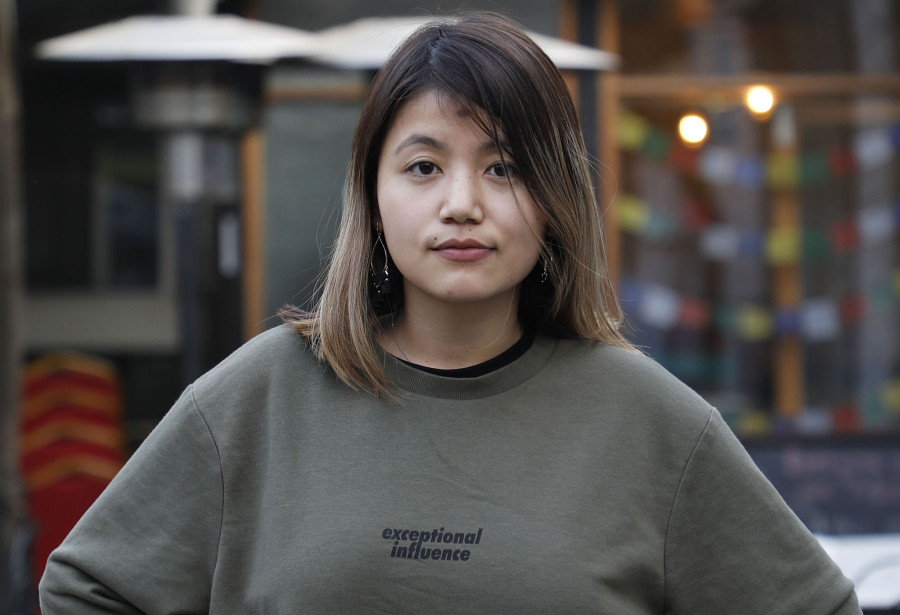Entertainment
Bartika Eam Rai on music, inspiration, and her first concert in Nepal
In 2016, Bartika Eam Rai released her first single, Khai—a mournful ballad about loss, longing and loneliness—on YouTube. The song resonated with Nepali audiences in a manner Rai had never expected.
Pranaya SJB Rana
In 2016, Bartika Eam Rai released her first single, Khai—a mournful ballad about loss, longing and loneliness—on YouTube. The song resonated with Nepali audiences in a manner Rai had never expected. Her soulful lyricism and haunting vocals were heartfelt and moving, sincere in a way not much of mainstream Nepali music is. Khai won Rai Song of the Year and Best Female Pop Vocal Performance at the 2074 Hits FM Music Awards, unexpected for an independent artist based in the US. With a new album, Taral, currently out, Bartika is in Kathmandu for her first Nepal tour. She performs today, December 5, at 5pm at Tangalwood. Pranaya SJB Rana spoke to Rai about homecoming, her music and her writing.
Welcome home, Bartika. How does it feel like to be back in Kathmandu?
Unfortunately, I haven’t had a moment to sit still and think about it in the way I would’ve liked to. I’m coming back after six years and at one point, I didn’t know if I would be coming back. So there was a lot of anxiety. I decided to do the shows and everything got so hectic and blew out of proportion. So it’s all been mixed. But it makes me happy. I’m seeing my mother after so long. My brother drives me around on his scooter, which I used to do earlier. I’m grateful.
You’ve titled your current Nepal tour ‘ghar’ so this is a kind of homecoming for you. What does home mean to you?
This is a question I’ve asked myself plenty of times in plenty of spaces around the world. It’s also something I write about a lot, not just in my songs but in this clumsy blog I have. It’s perhaps the places, spaces and faces that you’ve created a warm connection with. Even New York feels like home, now that I’ve lived there for so long. Earlier, I used to think that home is where my mother is, but I don’t think that is enough. I don’t really have an answer yet.
Does home have to be one place?
I don’t think that is possible at this point in time. Five years ago, I would’ve said it is undeniably Nepal and Kathmandu.
You started to release your music while in the US but your songs resonated with thousands here. How does that feel—to be away and yet, be so beloved back home?
It’s a really good feeling but it is very taxing. I’m not just a singer and I’m not just a musician. I’m a person who writes and sings in Nepali but lives in a non-Nepali world. So there’s this identity crisis and a lot of anxiety. And when you’re in your late 20s, there’s already enough of an identity crisis. It’s complicated. When people message me continuously, they think I’m sorted, but I’m not really sorted in the way that they think I am. It’s very emotionally taxing. I also deal with a lot of self-doubts musically, because I’m not technically sound. I did not study it and I did not train to be a musician. It takes a lot to be a musician—you have to have a lot of discipline and you have to practice every day. I like to sing but I’m not a fantastic singer. I know I can sing but I’m not technically fantastic. There is a connection there with others, I can see that, but I’m constantly questioning myself: why do so many people like this?
How does it feel to know that your music and your poetry is, in a way, universal and that people do identify with it?
That’s amazing. I feel very grateful for that. I just wanted to release my first EP to my aamaji, my friends and family. But they were like no, you should release it to more people. We didn’t expect people to identify with it or listen to it that closely. We released ‘Khai’, went to bed and when I woke up, it was crazy. We did not see that coming.
One characteristic of your music that many single out is your lyricism. Who are your writing influences?
More than songwriters, I read a lot of books. My aamaji, she would give me books on my birthdays. That was frustrating for me because as a teenager, I wanted dresses. But I read a lot. I love prose and I write prose. So when it comes to writers, I like Kurt Vonnegut, [Haruki] Murakami and Albert Camus.
Do you read any Nepali writers?
Not really. My aamaji is a Nepali teacher so we used to have a lot of novels lying around the house. I read excerpts from them. People have given me Nepali books but I haven’t really sat down and read any Nepali writing.
That’s quite surprising, given how well you write in Nepali.
I have read Bhupi Sherchan’s plays because my mother had them lying around. And my mother used to write me letters when I was in boarding school. When I was in grade five or six, other parents would leave food for their students. My mother would leave me letters. She often wrote this one line that has stayed with me: afu le afno awalokan garnu parcha. One should be reflective, introspective. So that’s probably where I picked it up.
You have a day job as an accountant and by night you’re an artist. How do you reconcile these two halves?
Reconcile, that’s an accountant’s word. In a way, it’s good for me. All these experiences lead me to write about them. If I just did music, I don’t think I would write about the things I write about now. Honestly, I have to pay rent. I studied accounting for four years, so why not?
How do you find the time to write and compose music?
I don’t sit down and think, I’ll write for three hours. Sometimes, I wish I could because I would’ve finished a novel by now. For me, writing is very organic. Sometimes I’m writing on the train to work. Sometimes I get songs in my dreams. When I’m in a dark space, a little low, it’s my only way out. If I don’t write, I don’t think I can go on.
So the words come first and then the music. Is that what your process is like?
Sometimes I have the words and I put them to music. Other times, I feel inspired. And other times, I’ll just be jamming or listening to a Regina Skeptor song and I’ll get a melody. Technically, I’m very limited. I don’t even know many chords. All the improvisation I do is in my vocals. Sometimes it starts with writing, sometimes it’s a progression.
You often share photos and videos of the people in your life who’ve inspired you. At this moment in time, who’s your biggest influence?
In May-June, I released Taral and did my US tour. In July, I started a new job at an arts council and for the next four months, I completely stopped doing music. I wanted to give my time to one thing. My Nepal tour is going to be my biggest collaboration now. Rather than influence, I would say it’s a collaboration.
So far, both your albums were produced by Diwas Gurung. Are you planning to work with a different producer in the future and maybe pursue a different sound?
After I released Bimbaakash, I thought this is it, I’m not going to do anything more. But then I missed it. I was in New York and at that time, I thought I might return to Nepal for good. I thought I should do one more album with him before I leave, so we did Taral. I definitely want to collaborate with a lot more people and a lot more genres.
Anyone in mind?
I like Rajan [Shrestha] dai. I’m a big fan. He would be great to work with. I also want to do a project with Yugal [Gurung], but he has Haami [his band] and his solo project. We have done one song together though.
So where do you go from here—musically, professionally, personally?
One step at a time. This is my first ever Nepal show so I don’t know what people think of me. But its okay, I have to say what I want to say. I want to write, maybe a collection of stories.




 9.8°C Kathmandu
9.8°C Kathmandu










